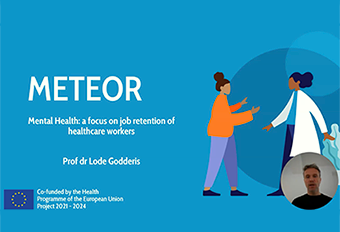METEOR researchers Lode Godderis and Anke Boone presented the project’s findings at the webinar “Health Workforce Challenges: Ways Forward for Policy-making”, organised by the EU Health Policy Platform on 26 January. The event attracted more than 200 participants from across Europe.
Building on the three-year research project, Godderis and Boone presented policy recommendations on how to prevent nurses and doctors from leaving their hospital jobs. Godderis underscored the importance of adopting a holistic approach to address retention in hospitals across Europe, highlighting four areas for change.
First, he stressed the importance of professional and personal support for workers through initiatives such as transformational leadership, sabbaticals, and adoption of a self-rostering system. Second, he pointed to education and development, emphasising the importance of an active approach to technical, medical, and soft skills training, as well as mentorship and peer support groups. Financial incentives are the third area where changes are needed. Here, solutions include competitive salaries, permanent contracts, and other measures increasing job security. Finally, changes in the regulatory environment can also help keep healthcare workers at their posts. Adjusting rules for the worker-to-patient ratio, adopting the Care Burden Instrument & Monitoring, and defining new roles and functions are just a few examples of regulatory solutions that can help stabilise employment.
During the discussion, Anke Boone stressed that there is no “magic bullet” that will immediately solve healthcare staff shortages, emphasising the need for concerted and multifaceted action. She addressed the persistent challenge of an imbalance between supply and demand of healthcare workers, which results from a shortage of trained employees, inefficient task planning, and flawed management of available resources.
Additionally, she explored the relationship between medical deserts and worker retention. Boone argued that medical deserts, characterised by a scarcity of medical professionals in certain fields, intensify workforce retention issues. Professionals often leave understaffed regions due to challenges such as a lack of transport, expertise, colleagues, and social support, all of which contribute to burnout and job dissatisfaction.
The webinar was hosted by Matthias Wismar of the European Observatory on Health Systems and Policies. Researchers from the four other projects in the Health Workforce Project Cluster took part in the discussion: Giovanni Baglio (OASES), Ronald Batenburg (ROUTE-HWF), Corinne Hinlopen (AHEAD), and Eszter Kovacs (TaSHI).
Sabine Stordeur, Director General of the Belgian DG Public Health, also joined the event to discuss her country’s upcoming EU presidency and share insights into planned initiatives in the area of healthcare policy.



